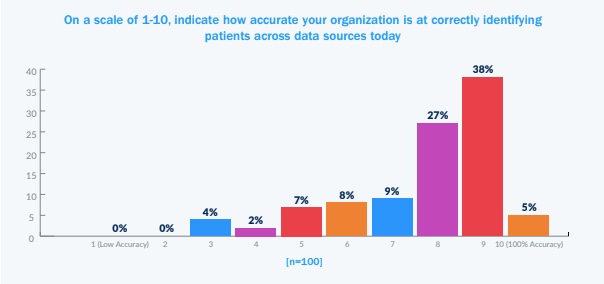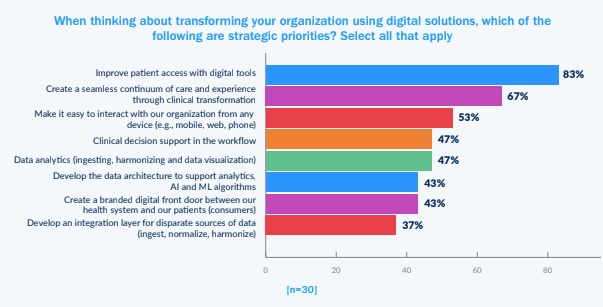
Baltimore, Maryland-based Sage Growth Partners and Verato, based in McLean, Virginia, recently released the results of a survey that found many healthcare systems have inaccurate details regarding patients, which negatively impacts patient care, financial, and operational goals.
The survey of 100 healthcare leaders reported that a majority of healthcare organizations did not feel they could produce an accurate 360-degree view of their patients, despite the requirement of knowing “who is who” to improve patient outcomes, increase profitability, and speed up initiatives, including digital transformation as well as population health management.
The report indicated that patient identity information is connected to most strategic priorities. A vast majority at 88% listed patient identity as key to enhance the patient experience with 75% listing patient identity as essential for improving care management, the report said. Further, 72% of respondents indicated “concern” or “extreme concern” that siloed, inaccurate personal data negatively impacted the bottom line as well as care quality. Not only that, but 60% went as far as to say patient identity data is important to all functions and initiatives within the organization. 73% indicated patient identity is critical to a digital front door, as well.
“These executives know that they must have the right patient data in place to activate on these priorities, but unfortunately, not many of them will be able to at the rate of success that they’d like. They lack confidence in their patient data, and for good reason. Most identity resolution algorithms only have an accuracy rate around 65%, which means that nearly half of an organization’s patient data could be wrong, duplicated or fragmented,” said Clay Ritchey, CEO of Verato in an email. “The 65% accuracy rate being achieved by basic or baked-in identity resolution software is nowhere near good enough, especially when patient care is on the line.”

Inaccuracies with patient identity data creates issues for managing risk as well as population health, which ultimately exacerbates health inequities, the report said. Further, siloed, inaccurate patient data harms not only the quality of care, but also the bottom line, although the report didn’t provide any details on how much the financial impact might be.

A Deep-dive Into Specialty Pharma
A specialty drug is a class of prescription medications used to treat complex, chronic or rare medical conditions. Although this classification was originally intended to define the treatment of rare, also termed “orphan” diseases, affecting fewer than 200,000 people in the US, more recently, specialty drugs have emerged as the cornerstone of treatment for chronic and complex diseases such as cancer, autoimmune conditions, diabetes, hepatitis C, and HIV/AIDS.
Despite the importance of accurate data, only 14% indicated they were extremely satisfied with their patient identity management solution’s current level of accuracy, according to the report.

The survey indicated that health systems listed the following as the three highest strategic priorities: improving patient satisfaction scores (42%), addressing resiliency and workforce shortage, and digital transformation initiatives (37%). Accurate patient information directly impacts all three of these. For example, correct patient identity can improve the patients’ satisfaction and experience. Conversely, incorrect data could cause wrong test results, delays in treatment, and poor patient outcomes, the report said. Further, if a patient receives incorrect information from a care provider, they will likely switch to another, according to the report.
Almost all (91%) of respondents indicated that having a complete, comprehensive view of data about the patient — for instance, race, where they live, ethnicity — was either extremely or somewhat important. Nearly all (92%) reported social determinants of health as essential for reaching analytics goals.
In addition to patient satisfaction, respondents said their second highest priority is digital transformation initiatives, with 86% stating the pandemic quickened the need for digital offerings to both gain and keep patient, the report said. The report defined these as both seamless clinical and patient experiences as well as boosting patient access.

However, respondents indicated issues with accurate patient information – from fragmentation of data to identity issues – which the report said could be attributed to mergers and acquisitions when multiple EHR solution platforms join. For example, lab data or EHR could contain errors or incomplete or redundant data.
“Integrating patient data from across siloed sources, like EHRs, billing systems and more, enables a drastic reduction in duplicate records, as well as greater interoperability and data accuracy throughout the healthcare organization,” Ritchey said in an email. “With the right data solutions in place, healthcare organizations can improve the patient experience, operational efficiency and patient satisfaction – important issues during the Covid pandemic and beyond.”
The study was conducted by Sage Growth Partners. Verato commissioned the report.
Photo: Getty Images; Graphs: Verato Market Report












